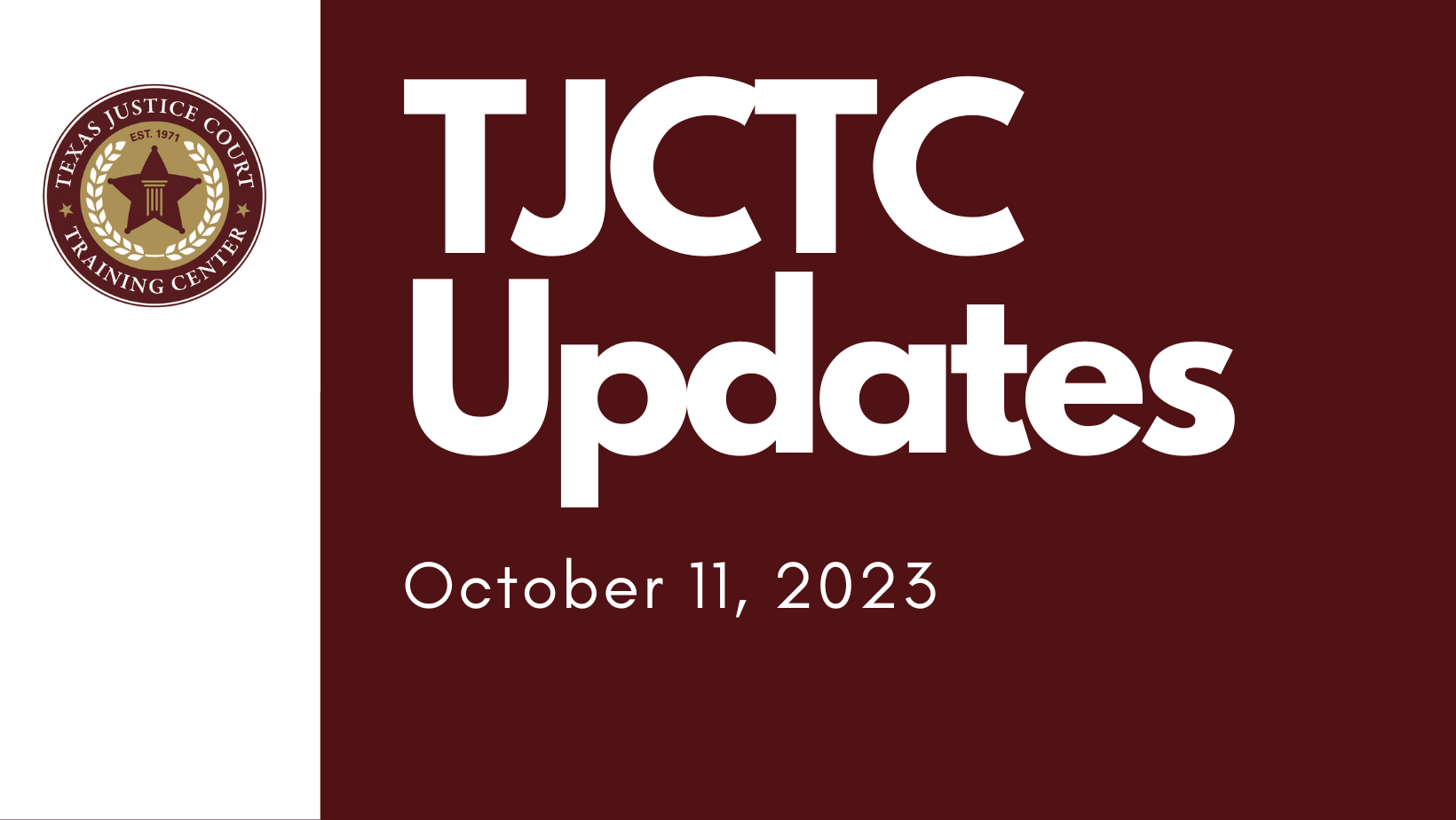Hello Judges, Constables, Deputies, & Court Staff,
How is it already May?! As you gear up for summer, we wanted to share upcoming training opportunities, grants, a new “Legal Question of the Month” feature, and of course more resources for your courts and offices.
Legal Question of the Month
Do I have to appoint a receiver?
No. You don’t have to appoint a receiver or issue a turnover order under Civil Practice and Remedies Code 31.002. However, you must consider applications for this relief and make your decision based on the application and case at hand. You should not have a blanket policy that you never issue receivers. Here is a snippet from some caselaw on the topic:
“Although subsection (a) of the statute uses the word ‘entitled,’ the use of ‘may’ in subsection (b) makes the remedy discretionary.” See Barlow v. Lane, 745 S.W.2d 451 (Tex. App. 1988), Beaumont Bank N.A. v. Buller, 806 S.W.2d 223 (Tex. 1991).
“We review the trial court’s decision for an abuse of discretion…whether there is evidence to support the decision is a relevant consideration. The ultimate question, however, is whether the court acted in an unreasonable or arbitrary manner or without reference to any guiding rules.” See Beeler v. Fuqua, 351 S.W.3d 428 (Tex. App. —El Paso 2011).
What this means is that if you just have a general rule that you don’t like receiverships and you don’t want to do them, you are probably abusing your discretion. However, if you review the applications closely or have some other reason not to grant the application and are not denying the judgment debtor other ways to collect their judgment (writ of execution, turnover order, etc.), then you can deny an application for a receiver. It would also make sense that if a particular receiver has acted improperly before, that you might have reason not to appoint them (just like if you no longer trust a process server, because they provided false information in a return).
The Ft. Worth Court of Appeals just ruled about a court using their discretion to deny the appointment of a receiver using the following logic:
“Employer’s attorney’s affidavit, in which she conveyed her ‘understanding’ that former employee owned nonexempt assets, ‘including bank accounts, income, personal property, and interest in real property,’ was not competent evidence of employee’s ownership of nonexempt property as would support issuance of turnover order to satisfy employer’s judgment against employee, because the affidavit showed no personal knowledge, and attorney’s recitation of her ‘understanding’ was conclusory.” Vaccaro v. Raymond James & Associates, Inc., 655 S.W.3d 485 (Tex. App.-Fort Worth 2022).
The Houston Court of Appeals ruled similarly:
Presenting some evidence of right to turnover relief and showing nonexempt status of judgment debtor’s remaining funds does not automatically mandate trial court to order turnover of funds to judgment creditor; rather, trial court has discretion to consider other relevant factors such as ability of judgment debtor to meet living expenses if turnover relief is granted. Brink v. Ayre, 855 S.W.2d 44 (Tex. App.—Houston [14th Dist.] 1993)
Grant Opportunities
We know that coming up with the necessary funding isn’t always easy. The Texas Association of Counties (TAC) shared a few grant opportunities for courts and rural county officials last month that we wanted to pass along.
Upcoming Training
Ask about Suicide to Save a Life (AS+K) Virtual Training
The Health and Human Services Commission is hosting a training on May 15 from 9:00 a.m. – 12:00 p.m. CDT on warning signs, clues and suicidal communications of people in psychological distress, and the actions to take to prevent a possible tragedy. Capacity is limited and pre-registration is required. RSVP at suicide.prevention@hhs.texas.gov.
Justice Court Section Webinar – Civil Trial and Pretrial Rules and Practice in Justice Courts
Presenter, Rebecca Glisan, TJCTC Director of Curriculum & Staff Attorney
This course will cover some of the specific rules and common issues that arise in justice courts related to jury and bench trials as well as pre-trial motions and hearings. Topics will include continuances, mediation and agreed orders, summary disposition, discovery, evidence, development of the facts of the case, preparing the jury, and more.
Friday, May 17, 2024 from noon – 1:00 pm
Registration Link: https://us06web.zoom.us/meeting/register/tZ0uf-qprTwiEt0SfYLrJi12yZMulvcVHzA9%20#/registration
Free Lexipol Training for Law Enforcement
One of the top-national law enforcement training organizations, Lexipol, has partnered with Dak Prescott’s Faith, Fight, Finish Foundation to offer some free training for law enforcement. This could be helpful to constables and deputies looking for additional training to complete all of their TCOLE requirements.
Recording For Credit Posted
Mental Health Resources for Judges
TLAP helps judges with issues related to substance use or mental health disorders and maintains a list of volunteer judges who are interested in providing support to peers in crisis. This class will feature a discussion with TLAP and the resources available for judges dealing with issues such as vicarious trauma. The handouts for the course are also attached to his email.
Click here to view the recording
Sequential Intercept Model Mapping Opportunity
Texas Health and Human Services (HHSC) has published the Fall 2024 Sequential Intercept Model (SIM) mapping workshop application for communities interested in working with the HHSC Office of Forensic Coordination to map local behavioral health, criminal justice, or juvenile justice systems and develop action plans. The application deadline is May 17, and the application and more information about the SIM process is available at on the HHSC website.
Mental Health Awareness Month
This month is Mental Health Awareness Month, so we compiled the resources in the following newsletter for you to use throughout the month to bring awareness to the topic that so-often comes up in your courts.
You can also find additional news about the intersection of mental health and courts at JCMH News.
We hope that you find these resources helpful and enjoy the warmer weather!
– Thea and the TJCTC Team




